Publications

May 1, 2015
Police and community members in the communities of Rochester, Durham, and Dover spent three hours in each location discussing how to encourage mutual understanding and trust between communities and police. Participants from law enforcement and individuals from local neighborhoods worked together to reframe community problems as social issues where both community members and police play a role in...
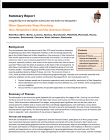
May 1, 2015
The conversations that took place in early May 2015 were focused on informing and getting input from New Hampshire residents on the increasing opportunity gap in the United States and in New Hampshire. Does everyone in New Hampshire have similar opportunities to succeed economically and socially? Is it harder to get ahead now than it was in previous generations? How can we make sure that everyone...
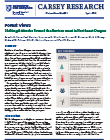
April 21, 2015
Residents of northeast Oregon were surveyed by telephone in an effort to assess individual perceptions of forests and natural resource management. Results show that residents are generally well informed about declining forest health, and they identify active forest management as a high priority. Just over half of residents support increasing public land use fees to pay for forest restoration...
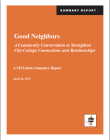
April 14, 2015
During the winter and spring of 2015, the Keene College/City Commission worked with NH Listens to design a community conversation that would focus on one of the four priorities identified by the Commission in 2014— citizenship. As stated in its working charge, the Commission was established with, “the goal of improving the quality of life for residents, students, employers, and visitors while...
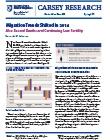
March 26, 2015
In this fact sheet, author Ken Johnson reports on new Census Bureau data released on March 26, 2015. The data provide further evidence that the recession’s influence on domestic migration is diminishing. Migration patterns are reverting to those commonly seen before the recession. Suburban counties of large metropolitan areas are receiving more domestic migrants, while large metropolitan core...

March 9, 2015
Public discourse on economics in the United States, and around the world, often focuses on rising income and wealth inequality. The “Occupy” movement drew great attention to the rising fortunes of the top one percent while middle- and lower-income Americans lost ground. Vast scholarly, political, and media attention is focused on issues of growing inequality and implications for broader societal...
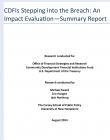
February 24, 2015
In CDFIs Stepping Into the Breach: An Impact Evaluation Summary Report, published with the U.S. Treasury Department's Community Development Financial Institutions Fund, authors Michael Swack, Eric Hangen and Jack Northrup analyze the impact of financial assistance awards and recipients of the Community Development Financial Institutions (CDFI) Program.
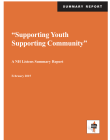
February 11, 2015
The Milton School District, along with a group of community members, teachers, and local civic leaders, worked with New Hampshire Listens to design a community conversation on the best way to support the young people of Milton to grow, thrive, and succeed.

February 11, 2015
This brief assesses trends in access to, enrollment in, and success in Advanced Placement (AP) coursework in relation to school district poverty, racial composition, and urbanicity. It uses data merged from the 2011–2012 Civil Rights Data Collection (CRDC), the 2012 Small Area Income and Poverty Estimates (SAIPE), and the 2010 Decennial U.S. Census. Authors Douglas Gagnon and Marybeth Mattingly...
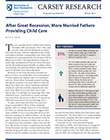
February 3, 2015
The U.S. economy lost 8.7 million jobs between December 2007 and January 2010.1 Sixty-nine percent of the jobs lost during the recession were held by men, 2 and the employment rate of married fathers (whether working full or part time) with employed wives decreased from 92 percent in 2005 to 88 percent in 2011.3 The large job losses and persistently high unemployment from the Great Recession and...
